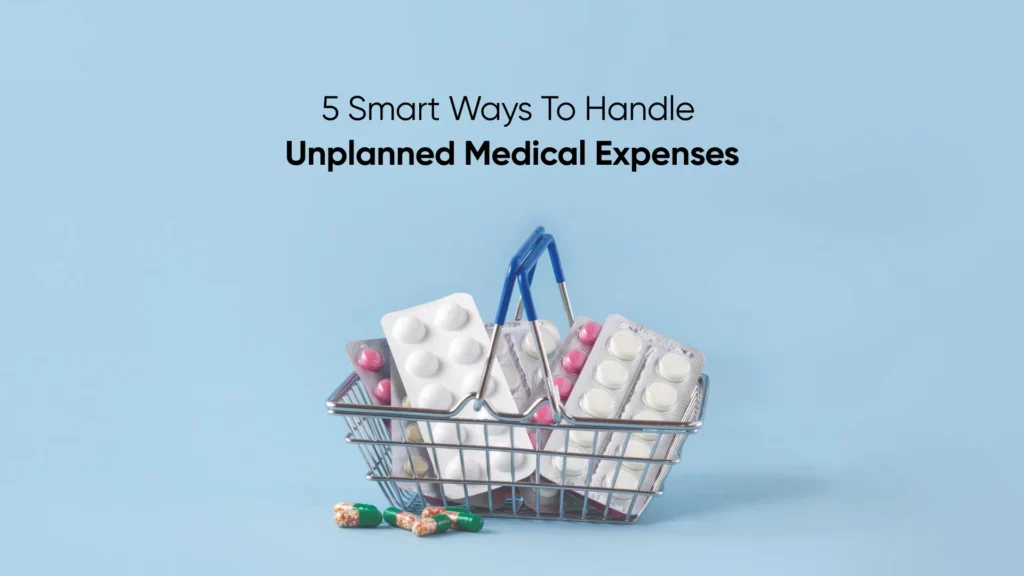5 Smart Ways to Handle Unplanned Medical Expenses

Getting hit with medical bills can really mess up an individual’s life. That’s why it’s important to have some emergency money saved up. This fund saves lives when you least expect it. It allows you to keep prepared without having to borrow money from anyone or go into debt. So, having an emergency fund can help you deal with difficult life situations with greater preparedness. Let’s learn more about the importance and different ways to handle unplanned medical expenses:
Table of Contents
ToggleImportance of an Emergency Fund
An emergency fund is money set aside for unexpected life occurrences. Have you ever wondered why having an emergency fund is important? The most important consideration is financial security. An emergency fund serves as a life jacket when unexpected bills arise. During an emergency, people may borrow money from peers or take out urgent personal loans, which might add to their debt. With emergency money, you may be prepared for any such scenario and avoid debt, maintaining financial stability. Emergencies often require quick responses, and having finances allows you to remain financially stable and live peacefully without major issues.
5 Effective Strategies to Manage Unexpected Medical Costs
Effective solutions for handling unexpected medical bills are essential since they will help you avoid any financial difficulties that may come your way. Individuals who do not plan ahead of time may find themselves unprepared to deal with unexpected medical expenses and difficulties.By planning efficient measures, such as setting up an emergency fund, securing adequate insurance coverage, and considering a loan for medical expense, you can better manage unexpected medical expenses and avoid debt accumulation.
Emergency Savings:
Having an emergency fund is essential for financial stability and can help during unexpected crises, such as medical emergencies. Without such funds, people may have to borrow money or accumulate debt, which can lead to a long-term financial disaster. An emergency savings fund allows individuals to pay sudden expenses without jeopardising their long-term savings or retirement plans. It provides peace of mind to know that there are funds set aside for such unforeseen circumstances. Furthermore, having an emergency fund enables people to face challenges and make informed decisions without the burden of financial insecurity. Having an emergency fund is just preparing for life’s worst-case scenarios and protecting your financial well-being.
Medical Loan
Medical emergency loan is a financial tool for medical emergencies that provide access to funds when you need it the most. These loans are quick and hassle free, allowing individuals to apply online with ease and convenience. The repayment terms, with EMIs, helps an individual to manage the burden, making a loan for medical expenses a good option. From minor medical treatments to major surgeries and hospital stays, these loans cover a wide range of expenses, ensuring individuals can receive necessary medical care without worrying about immediate financial constraints. Considering a best loan for medical expenses enables individuals to prioritise health without affecting their financial well-being.
Credit Cards
Credit cards can provide you with fast financial support. You receive the funds conveniently and can use them for medical situations. However, funding will be restricted, and it is only a viable alternative if you can repay the money on time. Credit cards have high personal loan interest rates, therefore instant repayment is important to avoid any type of debt that could cause problems. Overall, credit card usage is being aware of your spending habits, living within your means, and actively managing your credit card balances. By practising responsible usage, you can enjoy the benefits of credit cards while avoiding the potential drawbacks associated with debt and financial instability.
Maintain a Strict Budget
Medical expenses could wipe out your savings and cause you to lose track of your finances. However, you must stick to a strict budget and be prepared for any unforeseen events that may arise. For building a proper budget, first establish a clear financial plan. This involves setting aside money specifically for medical expenditures, savings, and other important necessities. Another crucial aspect of budgeting is focusing on basic necessities and avoiding non-essential purchases. This proactive strategy will keep you on track financially, decrease stress, and ensure that you can deal with unforeseen medical bills without jeopardising your overall financial health.
Planning for Future Medical Emergencies
Planning for future medical emergencies is important for maintaining financial stability. Start by building an emergency fund. The goal should be to save at least 4 to 6 months of living expenses that would cover medical costs. Setting a health saving account can also be beneficial, a dedicated account only for medical expenses. Additionally, while creating a monthly budget, always consider medical expenses and set aside a certain amount to manage health care costs. Regular health check-ups and maintaining a healthy lifestyle can also reduce the likelihood of emergencies. These proactive steps ensure you are prepared for any medical emergencies, safeguarding your health and future.
How Personal Loans Help Manage Medical Expenses?
Personal loans for medical expenses offer flexibility in usage with fixed interest rates and manageable personal loan repayment terms. This can help someone to access funds quickly especially during medical emergencies. Few benefits of personal loans for medical expenses are:
Quick funds: Urgent personal loans allow an individual to cover medical bills quickly without any delay.
Flexible Usage: Personal loans can be used for a variety of medical bills, including surgeries, because they provide fast access to funds and are flexible based on the requirements
No Collateral Required: Personal loans are often unsecured loan, which means you are not required to submit any assets as collateral.
Fixed Interest Rates: Personal loans offer fixed interest rates, making it easier for anyone to manage monthly payments.
Easy Application Process: The application process for personal loans is easy and convenient, without much hassle which is crucial during emergency situations.
Repayment Terms: Personal loans have flexible repayment terms, which allows you to choose a repayment timeline that suits your needs.
Also Read: Fixed vs. Floating Interest Rate on Personal loan – Which is Better?
Conclusion
To effectively manage medical expenses, you must take a proactive approach. Managing an emergency fund for immediate requirements, utilizing health insurance advantages, personal or medical loans, and adopting other smart measures will help you manage unexpected medical bills with ease. These wise decisions ensure that you are prepared for any such challenging emergency situations and helps you maintain financial balance.
Frequently Asked Questions
Building an emergency fund, having health insurance, and opening a Health Savings Account are all effective strategies to prepare. Maintaining a budget, regularly checking your insurance coverage and preparing for medical bills will also help you for unexpected medical expenses.
Yes, using a credit card for medical bills can result in high-interest debt if not paid off promptly. Missed payments might have a negative impact on your credit score. To reduce financial burden, credit cards should be used carefully and with a clear payback plan.
Instant personal loans like Zype, medical loans, and financial aid programs offered by hospitals or non-profit organisations are other choices for financial support.
To use credit cards sensibly for medical bills, only charge what you can afford to pay back quickly. Choose a card with low interest rates and look at cards that give incentives or return on medical expenses. Always make more than the minimum payment to avoid incurring high-interest debt.
Yes, Section 80D allows anyone who purchases a mediclaim coverage to cover hospitalisation expenditures, health treatment, and medical tests to seek for a tax exemption.This means that medical expenses tax deductible under Section 80D can significantly reduce your taxable income, ensuring you are prepared for unexpected medical costs.
Having an emergency fund allows you to manage unplanned medical bills quickly, minimises stress, and contributes to your overall financial security by avoiding high-interest debts.













